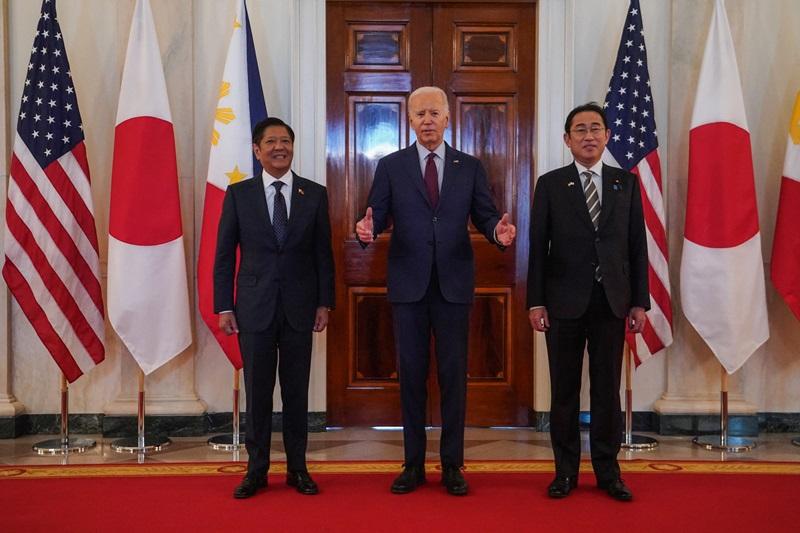PH, US, Japan commit to free, prosperous Indo-Pacific

WASHINGTON, D.C. — The Philippines, the United States, and Japan on Thursday committed to a free, prosperous, and secure Indo-Pacific, as leaders of the three countries met to discuss strengthening their ties moving forward.
During the Trilateral Leaders’ Summit at the White House, US President Joe Biden said the meeting of the three countries would center on deepening ties, and writing the story of the future together.
“As you’ve heard me say before, a great deal of history in our world will be written in the Indo-Pacific over the coming years as the three allies, three steadfast partners, and three steadfast democracies representing half a billion people,” Biden said.
“Today we commit to writing that story of a future together — to building Indo-Pacific that is free, open, prosperous, and secure for all,” he added.
Biden cited areas of deepening ties such as technology and clean energy, including securing the semiconductor chain and expanding trusted telecommunications in the Philippines, along with building a clean energy workforce.
He also announced the launching of an economic corridor — dubbed as the PGI Luzon corridor — which he said would translate to more employment opportunities across the region, and more investment in a sector “critical” to the future.
Biden also noted the strengthening of maritime and security ties among the three countries, as he cited treaties the United States has with both the Philippines and Japan.
“I want to be clear. The United States' defense commitments to Japan and the Philippines are ironclad. They’re ironclad. As I said before, any attack on Philippine aircraft vessels or armed forces in the South China Sea will invoke our mutual defense treaty,” he said.
Just last week, the naval and air forces of the three countries, along with Australia conducted a multilateral maritime cooperative activity (MMCA) in the West Philippine Sea, in line with their commitment to strengthen regional and international cooperation.
The China Coast Guard on March 23 water cannoned a Philippine resupply ship en route to the Ayungin Shoal, causing heavy damage and hurting three sailors. It was on a mission to provide supplies to the decrepit Navy vessel the BRP Sierra Madre that had been aground in the country’s outpost in the area
President Ferdinand “Bongbong” Marcos Jr. said the meeting on Thursday was a culmination of several preparatory engagements between foreign ministries, national security advisers, and vice ministers of the three countries he described as “friends and partners.”
“Facing the complex challenges of our time requires concerted efforts on everyone’s part, a dedication to a common purpose, and an unwavering commitment to the rules-based international order,” he said.
“This is a meeting that looks ahead as we deepen our ties and enhance our coordination. We seek to identify ways of growing our economies and making them more resilient, climate-proofing our cities and our societies, sustaining our development progress, and forging a peaceful world for the next generation. Today’s summit is an opportunity to define the future and how we can achieve it together,” he added.
Meanwhile, Japanese Prime Minister Fumio Kishida reiterated the country’s goal of boosting the trilateral relations among the three countries.
“In order to secure peace and prosperity in the Indo-Pacific, I hope to reaffirm our intention to further strengthen trilateral cooperation and to present the specific way forward through today’s meeting,” he said.
Kishida on Wednesday had a bilateral meeting with Biden, where the two discussed defense and security cooperation; space cooperation; economic, technology, and climate cooperation; and diplomacy, development, and humanitarian assistance, among others.
Latest data available from the Philippine Statistics Authority (PSA) showed that the United States was the biggest recipient of Philippine exports in February with $947.83 million or 16.0% of the total, followed by Japan with $849.17 million or 14.4%.
In terms of imports, Japan was the second-biggest supplier of imported goods to the Philippines with $845.23 million or 8.8% of the total, behind China with $2.18 billion or 22.8%. Meanwhile, the United States came in sixth with $550.16 million. — NB/BAP, GMA Integrated News




